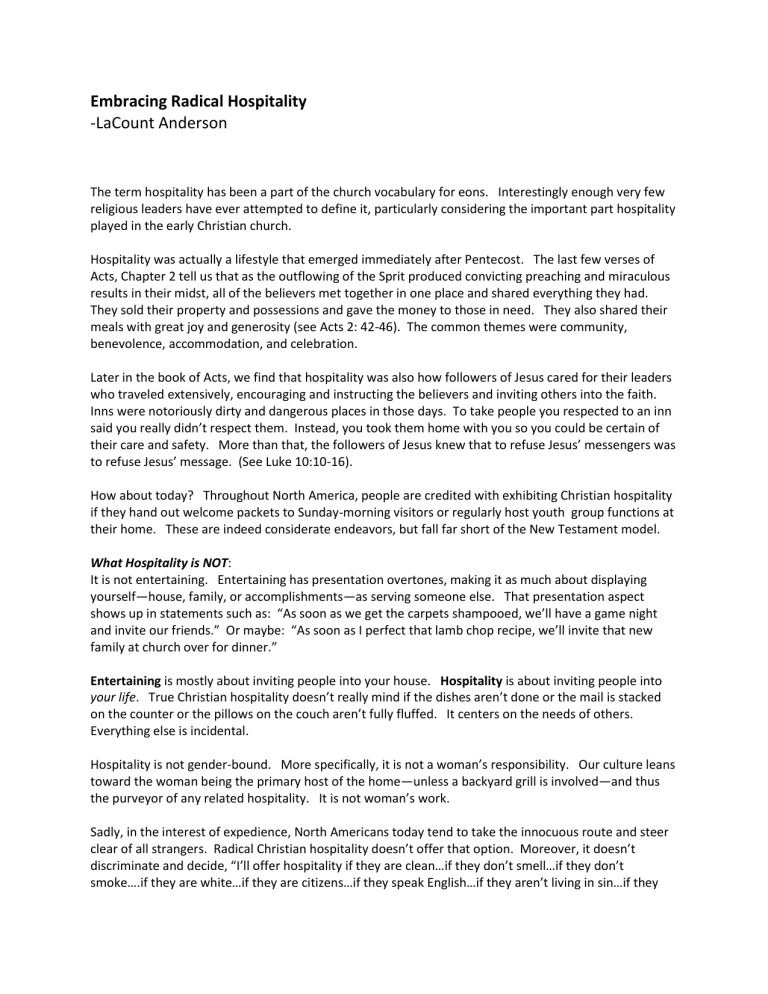Embracing Radical Hospitality

Embracing Radical Hospitality
-LaCount Anderson
The term hospitality has been a part of the church vocabulary for eons. Interestingly enough very few religious leaders have ever attempted to define it, particularly considering the important part hospitality played in the early Christian church.
Hospitality was actually a lifestyle that emerged immediately after Pentecost. The last few verses of
Acts, Chapter 2 tell us that as the outflowing of the Sprit produced convicting preaching and miraculous results in their midst, all of the believers met together in one place and shared everything they had.
They sold their property and possessions and gave the money to those in need. They also shared their meals with great joy and generosity (see Acts 2: 42-46). The common themes were community, benevolence, accommodation, and celebration.
Later in the book of Acts, we find that hospitality was also how followers of Jesus cared for their leaders who traveled extensively, encouraging and instructing the believers and inviting others into the faith.
Inns were notoriously dirty and dangerous places in those days. To take people you respected to an inn said you really didn’t respect them. Instead, you took them home with you so you could be certain of their care and safety. More than that, the followers of Jesus knew that to refuse Jesus’ messengers was to refuse Jesus’ message. (See Luke 10:10-16).
How about today? Throughout North America, people are credited with exhibiting Christian hospitality if they hand out welcome packets to Sunday-morning visitors or regularly host youth group functions at their home. These are indeed considerate endeavors, but fall far short of the New Testament model.
What Hospitality is NOT:
It is not entertaining. Entertaining has presentation overtones, making it as much about displaying yourself—house, family, or accomplishments—as serving someone else. That presentation aspect shows up in statements such as: “As soon as we get the carpets shampooed, we’ll have a game night and invite our friends.” Or maybe: “As soon as I perfect that lamb chop recipe, we’ll invite that new family at church over for dinner.”
Entertaining is mostly about inviting people into your house. Hospitality is about inviting people into
your life. True Christian hospitality doesn’t really mind if the dishes aren’t done or the mail is stacked on the counter or the pillows on the couch aren’t fully fluffed. It centers on the needs of others.
Everything else is incidental.
Hospitality is not gender-bound. More specifically, it is not a woman’s responsibility. Our culture leans toward the woman being the primary host of the home—unless a backyard grill is involved—and thus the purveyor of any related hospitality. It is not woman’s work.
Sadly, in the interest of expedience, North Americans today tend to take the innocuous route and steer clear of all strangers. Radical Christian hospitality doesn’t offer that option. Moreover, it doesn’t discriminate and decide, “I’ll offer hospitality if they are clean…if they don’t smell…if they don’t smoke….if they are white…if they are citizens…if they speak English…if they aren’t living in sin…if they
1 don’t have a prison record…if they show interest in Christianity…if their schedule works with mine…if…if…if….”
There is no shortage of churches today proclaiming themselves to be warm and welcoming, but he whole cannot genuinely bring to bear what the individual parts do not possess. Poor people do not want to be absorbed into a congregation of perky people; they long to be taken in by compassionate individuals who willingly share their provisions and perspectives, homes and hearts. Going forward, churches that will make a real difference in our world—and maybe even the ones that will survive—are the ones that can rekindle a perspective on hospitality like they had in the first century church.
View this link with Hugh Hollowell of Love Wins Ministry - http://vimeo.com/46595364
1 When Hebrews 13:2 cautions us not to forget to show hospitality to strangers, does that include people who may be on the streets? Do you know anyone who thinks he or she has entertained an angel through hospitality, and if so, how does that individual describe the experience?
2 What programs or services does your church offer that resembles early New Testament hospitality? Are they programs that attract men as well as women?
1
Invisible Neighbors – John Ashman, 2009 Cross Section, San Clemente, California: page 76-80. Summarized by
LaCount Anderson for this project.






